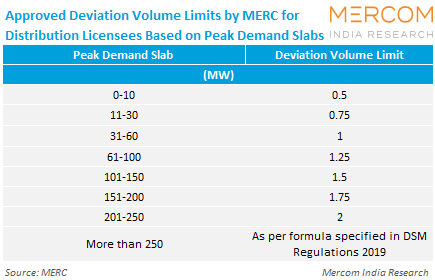Maharashtra Sets Deviation Cap for DISCOMs with Peak Demand Up to 250 MW
October 7, 2025
Follow Mercom India on WhatsApp for exclusive updates on clean energy news and insights
The Maharashtra Electricity Regulatory Commission (MERC) has approved deviation volume limits for distribution licensees and deemed distribution licensees (DISCOMs) with peak demand up to 250 MW, adopting Maharashtra State Load Despatch Centre’s (MSLDC) “Case-C” demand slab approach.
For DISCOMs with peak demand above 250 MW, the deviation volume limit will continue to be determined by the non-coincident peak demand (NCPD)-based formula under the MERC’s deviation settlement mechanism (DSM) Regulations, 2019.
Provisional limits communicated by the Commission on March 28, 2025, are now treated as final for the financial year (FY) 2025–26.
Background
The Commission has addressed the difficulty in fixing deviation limits for smaller DISCOMs that fell between the earlier dispensation for entities up to 20 MW and the formula-based regime for larger entities. Adani Electricity SEEPZ (ASP), a new deemed DISCOM, whose commercial operation began on November 1, 2023, with an expected peak demand of around 30 MW, exemplified the gap.
The 2019 formula yields about 0.2 MW for ASP, which is lower than the 1-2 MW dispensation for DISCOMs up to 20 MW. This prompted interim approvals of 2 MW for FY 2024 and again for FY 2025 while the issue was placed before the Commission.
Maharashtra State Load Despatch Centre subsequently analyzed 2,023 15-minute block deviations and proposed a demand slab approach, i.e., Case-C, for DISCOMs with peak demand up to 250 MW, while continuing the NCPD formula for those above 250 MW. During the matter, new state entities were impleaded and an amended petition was filed to reflect the slab proposal for 0–250 MW.
At the hearing on June 10, 2025, MSLDC reiterated that the proposed limits were based on actual deviations in 2023. MSEDCL argued that the additional 100 MW deviation band under the Central Electricity Regulatory Commission framework should be distributed among buyers based on either shares in NCPD or contracted renewable energy.
Adani Electricity Mumbai and Tata Power Company Distribution did not oppose the proposal. ASP cautioned that a high share of renewable energy in its power purchase could make it difficult to manage the lower limit. Brihanmumbai Electric Supply and Transport warned that small DISCOMs had been receiving relatively high percentage allocations and urged limits nearer values derived by the NCPD formula to avoid inefficient use and deviation settlement mechanism (DSM) pool deficits.
Commission’s analysis
The Commission noted that when the DSM Regulations, 2019, were framed, there were no DISCOMs in the 20–50 MW slab. However, ASL now falls within that slab, and more such DISCOMs may arise, creating an anomaly because the formula yields ~0.2 MW, whereas entities up to 10 MW had 1 MW, and those from 10–20 MW had 2 MW. It was therefore found that an appropriate regulatory measure was needed.
The Commission also recorded growth in the number of SEZ deemed DISCOMs to ten by 2023 and flagged that continuing 1 MW and 2 MW limits up to 20 MW risks exceeding the state volume limit under the CERC DSM framework, potentially increasing liability to the Western Region Power Committee.
Examining MSLDC’s analysis of 2023 block-wise deviations, the Commission recorded that under Case-C, the overdrawal of smaller DISCOMs exceeded the proposed limits for only 0 to 26% of time blocks, indicating that these entities can manage deviations within the proposed bands. It concluded that the Case-C limits are reasonable.
Acting under Regulation 21 (Power to Issue Directions), MERC allowed MSLDC’s prayer, approved the Case-C slabs for DISCOMs with peak demand up to 250 MW, and directed that those above 250 MW continue to be governed by the 2019 NCPD formula.
It confirmed that the provisional limits communicated on March 28, 2025, would stand finally approved for FY 2025–26.
In August, MERC released the Draft DSM and Related Matters Regulations, 2025, proposing significant changes to deviation accounting, scheduling, despatch, and financial settlements in the state’s power sector.
Subscribe to Mercom’s real-time Regulatory Updates to ensure you don’t miss any critical updates from the renewable industry.

